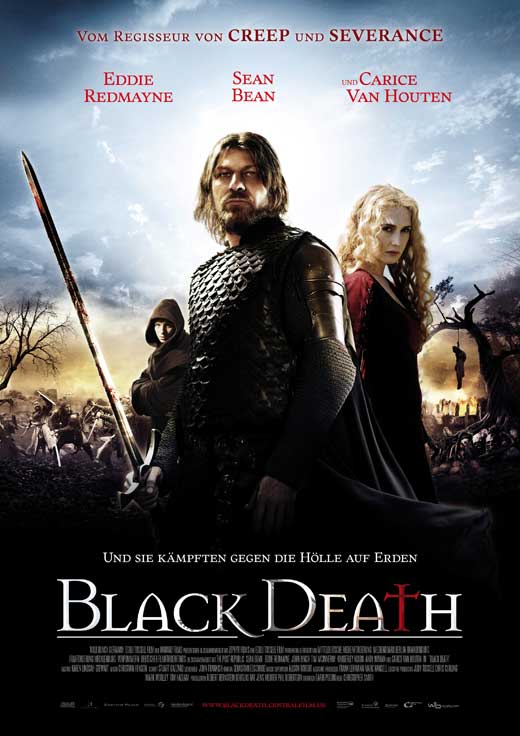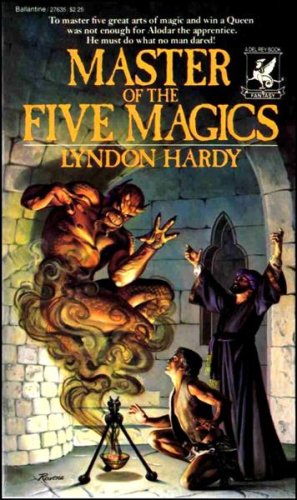 Yet again, I find myself watching middling movies at 1AM and then feeling moved to comment on the writing. I don’t think there’s much demand for such services, yet here I am. Once again: I have little regard for spoilers, so if ye fear spoilers, go watch the movie before reading this. I am sloppy with the spoilage.
Yet again, I find myself watching middling movies at 1AM and then feeling moved to comment on the writing. I don’t think there’s much demand for such services, yet here I am. Once again: I have little regard for spoilers, so if ye fear spoilers, go watch the movie before reading this. I am sloppy with the spoilage.
Black Death surprised me a little. I was intrigued by the premise and some good reviews I saw on random blogs – good reviews on random blogs (GRRBs) are not a good way to judge a movie’s overall quality, but they are a great way to detect otherwise hidden gems. Hidden gems have a lower bar in my mind – they can be bad movies, but with interesting moments or innovative ideas. So, I took a flyer on Black Death, and I was pleasantly surprised. Mildly, but still.
The first fifteen minutes or so dimmed my hopes, honestly. You start off with a date title card announcing it’s 1348. Add in an ominous voice-over (egads!) and a series of rather standard middle-ages images (filthy people, because people in the middle ages were filthy; monks in a monastery; dead bodies piled up like cord-wood everywhere) and you’re on a slippery slope. Throw in poor Eddie Redmayne playing a young, troubled monk (for what seems like the one millionth time), and then, my sweet lord, the ever-suffering Sean Bean playing Sweaty Man in Chain Mail with Conflicted Heart again, and it started to look like something made for pennies, possibly constructed entirely from outtakes of The Fellowship of the Ring and The Pillars of the Earth.
I mean, really, Sean Bean as a troubled, violent knight? The poor man. I like Sean Bean, and find him to be a charming actor. And yes, he looks good in chain mail with his dirty hair in his eyes, but can’t we give him a different sort of role sometime? When will his suffering end? HAS NOT SEAN BEAN SUFFERED ENOUGH FOR YOU JACKALS?
Ahem. Things, improve, though, once we get into the story. Which, in a nutshell, is: In the midst of the Black Death, a group of knights are sent to a remote village to investigate why the village has not seen a single case of the plague. They believe a Necromancer is using Dark Arts to protect the village, and the lead knight Ulrich, played by Bean, is determined to discover the necromancer’s identity, try them, and execute them. And possibly everyone else in the village, if he determines they are in league with the devil. They take a young monk (Redmayne) from a local monastery to be their guide through the marsh that makes the village so remote and difficult to access.
I won’t go into all the details of the story. What I will say is that the story is actually refreshingly straightforward and tight. We take our time at first, traveling with the knights and the monk for a while, which gives us a chance to actually identify them as characters. We see two encounters along the way which inform us as to their personalities, and establishes that the knights, for all their faith, are pretty savage, hard-bitten soldiers. And the characterizations are consistent – no one turns out to be the super secret bad guy at the end, no one has any sudden Complete Inexplicable Transformations at the end. The characters by and large behave as you would expect based on how they are introduced to you in this slow beginning section. Sad to say, this alone sets Black Death a little above most movies these days.
Once they arrive at the village, things get creepy. Ulrich pretends they are merely travelers seeking refuge, in order to suss out the Necromancer. The evil necromancer, a hot blond chick, manages to trick them all and capture them, and then turns the tables on them by torturing them and offering them their lives and freedom if they renounce Christ in a wonderfully perverted reflection of exactly what Ulrich planned to do to the villagers. If I have one quibble with the story, it’s that these battle-hardened knights who believe they’ve just entered a village awash in satanic power are pretty easily duped by the villagers in a way I saw coming five minutes before I started watching the damn movie; but while that part is pretty lazy writing it’s actually the only part of the film I would complain about, which ain’t bad.
The resolution of the story is nicely streamlined – there are no special effects, no bizarre twists. There are some twists, but in this debased age where M. Night Shyamalan has forced every movie of the last 15 years to have a Huge! Twist! Ending! That! Makes! No! Sense! these mild twists were actually organic to the plot, completely believable, and not even twists in the sense that you could have deduced them simply by paying attention. It’s also a pretty heartbreaking ending. Not shoot-me-I-can’t-stand-the-pain heartbreaking like the end of The Mist, but depressing enough.
The lack of special effects and horrible inexplicable twists was wonderful. The moment you hear there’s a “necromancer” in the story you might expect all sorts of bullshit effects, but Black Death takes a nicely realistic approach, imagining a village that is free from the plague because it is so remote, an evil, charismatic woman who takes advantage of the gullible villagers with just her personality and some basic pharmacological skills, and creates an atmosphere of dread from it.
It also manages to suggest that perhaps there is no difference between the faith of the villagers in their Protecting Witch and the faith of the knights in their protecting God, which is a nice bonus for an unassuming movie.
Overall, worth a viewing, I think. Especially if you’re a fan of Sean Bean at his most sweaty and dirty-looking.



